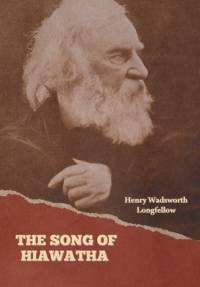Om The Song of Hiawatha
The Song of Hiawatha is an 1855 epic poem in trochaic tetrameter by Henry Wadsworth Longfellow which features Native American characters. The epic relates the fictional adventures of an Ojibwe warrior named Hiawatha and the tragedy of his love for Minnehaha, a Dakota woman. Events in the story are set in the Pictured Rocks area of Michigan on the south shore of Lake Superior. Longfellow's poem is based on oral traditions surrounding the figure of Manabozho, but it also contains his own innovations.
Longfellow drew some of his material from his friendship with Ojibwe Chief Kahge-ga-gah-bowh, who would visit at Longfellow's home. He also had frequent encounters with Black Hawk and other Sauk people on Boston Common, and he drew from Algic Researches (1839) and other writings by Henry Rowe Schoolcraft, an ethnographer and United States Indian agent, and from Heckewelder's Narratives. In sentiment, scope, overall conception, and many particulars, Longfellow insisted, "I can give chapter and verse for these legends. Their chief value is that they are Indian legends."
Longfellow had originally planned on following Schoolcraft in calling his hero Manabozho, the name in use at the time among the Ojibwe of the south shore of Lake Superior for a figure of their folklore who was a trickster and transformer. But he wrote in his journal entry for June 28, 1854: "Work at 'Manabozho;' or, as I think I shall call it, 'Hiawatha'-that being another name for the same personage." Longfellow was following Schoolcraft, but he was mistaken in thinking that the names were synonymous. The name Hiawatha is derived from a historical figure associated with the League of the Iroquois, then located in New York and Pennsylvania. The popularity of Longfellow's poem nevertheless led to the name "Hiawatha" becoming attached to a number of locales and enterprises in the Great Lakes region. (wikipedia.org)
About the author:
Henry Wadsworth Longfellow (February 27, 1807 - March 24, 1882) was an American poet and educator. His original works include the poems "Paul Revere's Ride", "The Song of Hiawatha", and "Evangeline". He was the first American to completely translate Dante Alighieri's Divine Comedy and was one of the fireside poets from New England.
Longfellow was born in Portland, District of Maine, Massachusetts (now Portland, Maine). He graduated from Bowdoin College and became a professor there and, later, at Harvard College after studying in Europe. His first major poetry collections were Voices of the Night (1839) and Ballads and Other Poems (1841).
He retired from teaching in 1854 to focus on his writing, and he lived the remainder of his life in the Revolutionary War headquarters of George Washington in Cambridge, Massachusetts.
His first wife, Mary Potter, died in 1835 after a miscarriage. His second wife, Frances Appleton, died in 1861 after sustaining burns when her dress caught fire. After her death, Longfellow had difficulty writing poetry for a time and focused on translating works from foreign languages. Longfellow died in 1882.
Longfellow wrote many lyric poems known for their musicality and often presenting stories of mythology and legend. He became the most popular American poet of his day and had success overseas. He has been criticized for imitating European styles and writing poetry that was too sentimental. (wikipedia.org)
Visa mer

